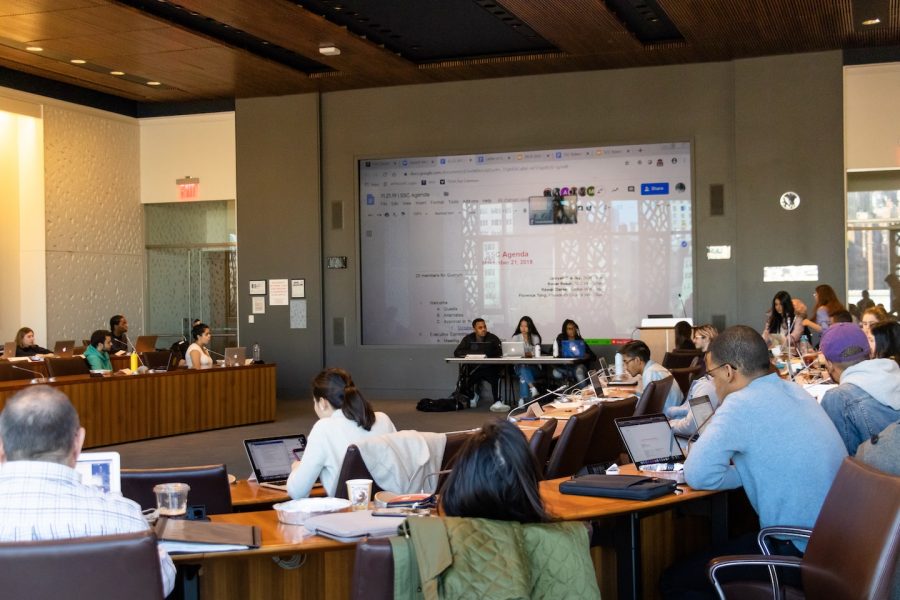Besides letters of support, NYU’s Student Government Assembly did not pass — or even present — a single resolution this semester. Instead, it has focused efforts on enacting change through direct relations with administrators and bolstering relations with students through outreach efforts.
From the start of the semester, SGA Chairperson Jakiyah Bradley said the group’s focus would be on leveraging relationships with administrators to improve students’ resources and better connect with its constituents.
As the semester comes to a close, SGA succeeded in changing NYU’s policy on academic probation, raising awareness through letters of support and connecting with constituents through town halls.
Expunged Academic Probation Records
NYU agreed to expunge academic probation records from students’ external transcripts, which are seen by those outside of the university, including potential employers. The university also changed its policy so that moving forward it would be standard to only mention academic probation on a students’ internal transcript, which is only accessible by those within NYU.
“This decision has thus far not only benefited students formerly on Academic Probation, but will benefit all students as well,” CAS senior and Chair of the SGA Academic Affairs Committee Quentin Turner wrote in an email to WSN. “The decision to reverse policy on the matter shows that the university has decided to take a stand in support of its students, as well as second chances.”
Students are put on academic probation when their GPA falls below a 2.0. Turner said the goal of the policy change was so students who apply to graduate programs or jobs are not penalized due to past academic struggles, which can stem from personal issues outside a student’s control.
Town Halls
Senators representing various minority groups on campus held town halls this semester.
At a town hall for undocumented, first-generation and low-income students and one for Latine students, students expressed similar sentiments: that NYU talks about supporting its minority students outwardly and often, but rarely acts to actually do so.
One example brought up by students was NYU President Andrew Hamilton’s statement that DACA students should “not hesitate to ask for assistance; [NYU is] here for you,” after President Donald Trump rescinded support for Dreamers supported by the program. Students said — despite this strong statement — the university failed to meet demands for an undocumented student center and additional financial, housing and emergency resources for undocumented students.
At a town hall for Jewish students, attendees and student senators voiced support for having Jewish high holidays Yom Kippur and Rosh Hashanah off as those who observe them are subject to restrictions that prevent working, or at least make working harder.
At the town hall, CAS senior and Senator at-Large for Marginalized Jewish Students Michael Bearman also referenced his efforts to make the Bronfman Center for Jewish Student Life more accessible to his constituents.
In addition to town halls for minority groups, two subject-matter town halls were held: one on financial aid and one on sustainability, the latter being co-hosted by Hamilton and Bradley.
Letters of Support
More in line with past iterations of SGA, this semester’s group passed multiple letters of support in hopes of raising awareness and spurring change.
A letter concerning the observance of Ramadan called on NYU to condemn Islamophobia and provide necessary support to students who observe Ramadan by altering exam schedules to allow for Muslim prayer services, among other measures.
Another letter in support of the Duke-UNC Consortium for Middle Eastern Studies condemned the U.S. Department of Education’s threat to revoke Title VI funding from the consortium. The education department wanted to withhold funding because the consortium did not mention historic discrimination against minority religions, such as Jews and Christians, in the Middle East.
On World AIDS Day, a letter was released calling on NYU to hire an HIV/AIDS professional at the Wellness Center to aid HIV-positive students experiencing mental health issues.
Student government also voiced support for the prison abolitionist group No New Jails and the closure of Rikers Island — criticized for its inhumane conditions — without building any new jails. Mayor Bill de Blasio’s current plan would build one large jail in each borough except Staten Island in order to compensate for Riker’s closure.
SGA also presented a letter supporting smaller language departments which struggle with finding rooms, especially during the popular time slot of 9:30 a.m. to 2 p.m.
Increased Diversity Through Alternate Senator at-Large Positions
Student government set a goal this year to diversify through its Alternate Senator at-Large positions. The Senator at-Large position was created to give minority groups a voice, and each Senator at-Large has an alternate with no voting power. Alternates can represent different communities than their senators.
At the start of the semester, Student Senators Council Vice Chairperson and CAS senior Kosar Kosar said the group would seek to increase representation of groups not well-represented on SGA, such as Latine students or black women.
Although no Alternate Senators at-Large were elected to represent Latine students, Gallatin junior Chynna Seck was elected to represent black womxn students and black students.
Kosar also said the positions provide an opportunity to hyper-focus on specific groups within minority communities. For example, Quentin Turner is the Senator at-Large for Students with Disabilities, Students with Learning Differences and LGBTQ Students. However, there are Alternate Senators at-Large for Students Affected by Disabilities in the Residential Life Community, LGBTQ Students of Color and LGBTQ Female/Femme Students.
A full list of representatives can be found here.
A version of this article appeared in the Monday, December 2, 2019 print edition. Email Ishaan Parmar and Victor Porcelli at [email protected].


























































































































































